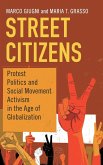If there is one thing that people agree about concerning the massive, leaderless, spontaneous protests that have spread across the globe over the past decade, it's that they were failures. Simply put, the protesters could not organize; nor could they formulate clear demands or bring about change. In the Street argues that in seeking to find the reasons behind these alleged "failures," we are asking the wrong questions. It argues that when our analysis of such events is confined by a framework of success and failure, we blind ourselves to the working reality of democratic politics, namely the on-the-ground efforts of political actors who, in becoming "political friends," demonstrate, if for a fleeting moment, that another way of being together is possible. The book develops an alternative conceptualization of democratic action through a close reading of Antonio Negri, Jürgen Habermas, and Jacques Rancière and the global protests of 1968 that inspired these political theorists and their work.
Hinweis: Dieser Artikel kann nur an eine deutsche Lieferadresse ausgeliefert werden.
Hinweis: Dieser Artikel kann nur an eine deutsche Lieferadresse ausgeliefert werden.









